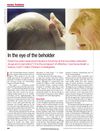1 citations,
January 2012 in “Springer eBooks” Mesotherapy can cause serious side effects like infections and skin reactions.
 November 2024 in “Journal of Scientific Agriculture”
November 2024 in “Journal of Scientific Agriculture” Silk proteins are great for cosmetics because they protect and improve skin and hair while being eco-friendly.
 July 2024 in “International Journal of Dermatology”
July 2024 in “International Journal of Dermatology” New methods and treatments for skin and hair disorders are being explored.
[object Object]  January 2023 in “Journal of Ravishankar University”
January 2023 in “Journal of Ravishankar University” Hair loss can be caused by stress, aging, and harmful substances that create an imbalance in the body's natural processes.
 April 2018 in “Journal of Aesthetic Nursing”
April 2018 in “Journal of Aesthetic Nursing” Professionals believe voluntary registers cannot ensure public safety like mandatory ones with laws.
January 2015 in “Indo American Journal of Pharmaceutical Research” Mesotherapy uses small injections to improve skin, reduce fat, and treat hair loss effectively and quickly.
 September 2006 in “Plastic and Reconstructive Surgery”
September 2006 in “Plastic and Reconstructive Surgery” Hair transplant surgeries can be improved by preserving follicles in a special solution, and surgeries done at outpatient facilities are more profitable than those at hospitals.
 305 citations,
July 2016 in “International Journal of Biological Macromolecules”
305 citations,
July 2016 in “International Journal of Biological Macromolecules” Polysaccharides have many health benefits and are used in drugs, but isolating and purifying them is complex and requires careful methods.
303 citations,
August 1971 in “The American Journal of Medicine” Melanocytes are destroyed by factors needed for melanin production, causing vitiligo and gray hair.
[object Object] 72 citations,
November 2000 in “Archives of Dermatology” Excision with primary closure is an excellent treatment for extensive acne keloidalis nuchae.
 67 citations,
April 2007 in “Journal der Deutschen Dermatologischen Gesellschaft”
67 citations,
April 2007 in “Journal der Deutschen Dermatologischen Gesellschaft” Shampoos are designed to clean and improve hair and scalp health, with specific ingredients for different hair types and conditions.
57 citations,
February 2016 in “Dermatologic surgery” Different reasons for large pores mean treatments need to be personalized.
51 citations,
March 2001 in “Clinics in dermatology” Bleaching damages hair, making it rougher and weaker.
 49 citations,
January 2003 in “American Journal of Clinical Dermatology”
49 citations,
January 2003 in “American Journal of Clinical Dermatology” Effective management of children's hair loss involves accurate diagnosis, various treatments, and supportive care.
47 citations,
March 1987 in “The Journal of dermatologic surgery and oncology” Carbon dioxide laser treatment effectively removed facial hair cysts without scarring or them coming back.
39 citations,
July 2005 in “Current medical research and opinion” Topical cream eflornithine 11.5% can slow hair growth and may help reduce hair removal frequency.
34 citations,
October 2015 in “British journal of dermatology/British journal of dermatology, Supplement” Scientists don't fully understand eyelash hair follicle biology, including growth and color, and suggest more research is needed.
 34 citations,
December 2012 in “Indian Journal of Dermatology, Venereology and Leprology”
34 citations,
December 2012 in “Indian Journal of Dermatology, Venereology and Leprology” Mesotherapy shows promise for cellulite and facial rejuvenation but has mixed results for body sculpting and hair loss, with more research needed for safety and effectiveness.
31 citations,
January 2019 in “Frontiers in Veterinary Science” Laser therapy improved surgical scar healing in dogs.
 28 citations,
August 2003 in “Nature”
28 citations,
August 2003 in “Nature” Cosmeceuticals may have potential but their effectiveness and market success are still uncertain.
27 citations,
March 2006 in “Dermatologic surgery” Medical tattooing is a widely accepted, easy, and permanent treatment with few side effects but carries an infection risk without proper sterilization.
26 citations,
November 2012 in “Clinics in Plastic Surgery” Various treatments can improve the appearance of the brow and upper lid by stimulating collagen.
 25 citations,
November 2005 in “Facial Plastic Surgery”
25 citations,
November 2005 in “Facial Plastic Surgery” The article concludes that surgeons should tailor facial surgery techniques for Asian males to their unique cultural and anatomical needs.
24 citations,
September 1995 in “The Journal of clinical endocrinology and metabolism/Journal of clinical endocrinology & metabolism” Medication and hair removal methods can improve hirsutism, but no drugs were specifically approved for it in North America as of 1995.
 23 citations,
January 2001 in “International journal of toxicology”
23 citations,
January 2001 in “International journal of toxicology” St. John's Wort extract and oil safety in cosmetics is unclear; more data needed on photosensitization, toxicity, and human irritation.
 19 citations,
October 2020 in “Biomedical Microdevices”
19 citations,
October 2020 in “Biomedical Microdevices” Derma rollers show promise for skin improvement and drug delivery, but more research is needed on their safety and effectiveness.
 17 citations,
June 2016 in “Australasian Journal of Dermatology”
17 citations,
June 2016 in “Australasian Journal of Dermatology” Treatment with dutasteride, minoxidil, and artificial hair transplantation improved appearance but caused folliculitis.
 14 citations,
August 2017 in “Dermatologic surgery”
14 citations,
August 2017 in “Dermatologic surgery” Men are getting more facial fillers, and doctors should use different techniques and fillers for men's unique facial features to get natural results.
 14 citations,
March 2010 in “Gynecological endocrinology”
14 citations,
March 2010 in “Gynecological endocrinology” New treatments for excessive hair growth in women include insulin modulators and enzyme inhibitors.
 14 citations,
September 2001 in “Dermatologic Surgery”
14 citations,
September 2001 in “Dermatologic Surgery” The document concludes that following specific surgical guidelines can improve scalp surgery results and reduce complications.
















